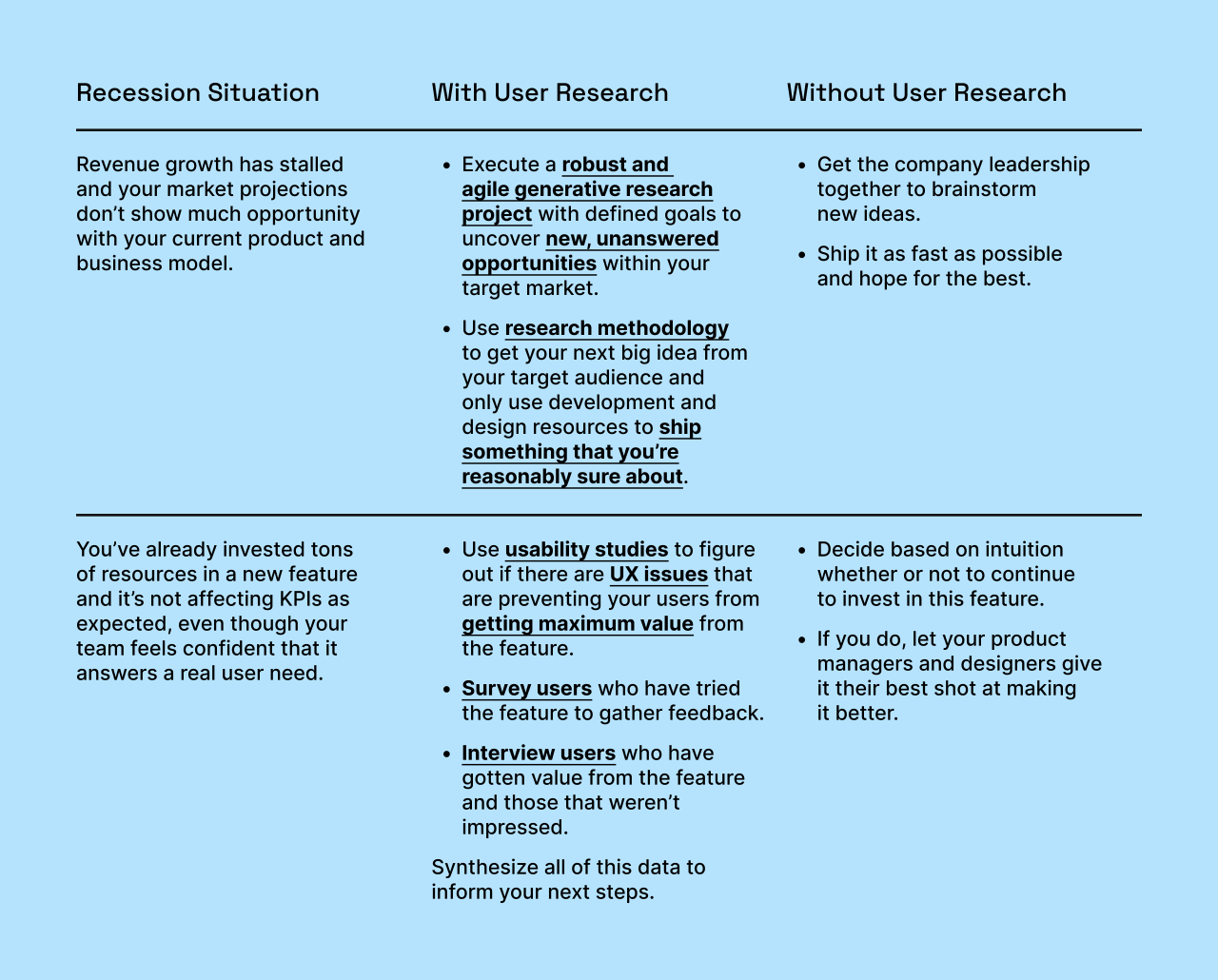We need research insights more than ever during a recession

Just deserts.
Research isn’t a nice-to-have. Understanding your customers is even more vital during periods of economic downturn.
In the current wave of economic uncertainty, companies are dramatically slashing their spending, including layoffs everywhere, from small startups to Big Tech.
Whether or not user researchers and UX researchers are disproportionately affected by layoffs is challenging to measure. Still, those in the field can anecdotally attest that our LinkedIn feeds are full of UXR colleagues who have been impacted.
One theory I’ve heard lately is that research is often viewed as a nice-to-have rather than a critical operation. Though you can probably guess that I disagree with this sentiment philosophically, it’s important to understand where it comes from.
Let’s take a tech company, for example. In a recession, investors and shareholders will hound a tech company’s leadership to increase profitability, cut the fat, and ship things fast.
Often, leadership looks at the people who produce code and UI as the primary drivers of product development. They view the ecosystem of professionals around them as secondary or tertiary, primarily because developers and designers create the final product deliverables.
A senior manager may think, “A UX researcher is a luxury, but a developer can deliver product iterations, and I can rely on intuition to guide them. My intuition is cheaper than my researcher!” Ok, perhaps they won’t be thinking in those exact words, but you get the idea.
Though I can empathize with the logic behind this way of thinking, here’s the thing: it’s misguided, and I feel pretty comfortable saying it’s a decision many companies will regret making. Here’s why.
UX Research deliverables are exactly what most companies need to weather a recession
Though the product nerds of the internet may debate the nuances, UX research and user research are often used interchangeably, and I’ll use them that way in this article.
That being said, for those unfamiliar with the field, the term UX research evokes a vision of things like usability testing or synthesis of user feedback. The term user research is often perceived as vague.
To understand the true value of user research during a recession, let’s first get on the same page about its scope.
Usability studies are certainly within the realm of UX research, but a user research operation can, and usually does, offer a lot more. User researchers are frequently trained to use a huge variety of research methodologies, including usability studies, but also things like participatory design, in-depth user interviewing, ethnography, surveying, quantitative methods, diary studies, concept testing of new ideas, and more.
When you put the power of that robust methodology together, you have a borderline magical ability to do things like:
- Understand why a product experiment didn’t work as planned to inform your next iteration
- Know what your target audience’s biggest unanswered challenges are before your competitors do
- Gather user sentiments about new features and ideas before you invest in their development
- Generate fresh, new product ideas informed by the reality of your market, whether you’re looking to add more value, execute a pivot, or both
That’s hardly an exhaustive list, but it’s a list of what I’d argue adds up to business superpowers. During a recession, there is an immense cost to operating based on assumptions and hoping for the best. Here’s some food for thought:

How research can save you during recession.
In both of these examples, you can see that user research allows a company to problem solve in a way that increases the likelihood that its product team will not just be shipping fast but that they’ll be shipping purposefully.
The product team will be making product iterations, pivoting, and moving forward in a way that is in sync with its users—the people who will ultimately determine whether or not a feature, an initiative, or a full-on 180-degree change is successful.
During better economic times, some company leaders may feel they have the time and space to ship, analyze, fail, and repeat until they meet their goals.
In the current climate, you’d be hard-pressed to find a leader who wouldn’t prefer to use its development, design, and other resources in a way that had more basis in the reality of its target market rather than relying on their best guesses.
User research can’t precisely predict how things will perform in the real world, but it most certainly gives tangible, concrete direction in a time when we can’t just meander and raise a new round of funding every few years.
User research can also help teams outside of product weather a recession
Most UX researchers sit somewhere in product, but many of us work with other teams to power them with user insights that impact their work.
My team at Lightricks works with marketing, for example, since paid user acquisition is a huge part of our business, and things like messaging and branding really impact our bottom line.
I also have experience working with our business development team when they were in the market to acquire small companies that could help us reach our business goals. My team interviewed the users of the platforms we were considering for acquisition to get insights about its value propositions, strengths, and weaknesses from a perspective beyond its user behavior data and primary KPIs.
Every organization has different needs, but in general, and particularly during a recession, it’s worthwhile for leadership to think about how user perspectives and qualitative data can help with decision-making and affect the KPIs of teams outside of product.
Overall, user research is a source of truth that most companies can’t afford to miss
A capable, healthy user research team has its fingers on the pulse of your market, not only in numbers but also from the perspective of the human experience.
Market data and institutional knowledge go a long way, but ultimately, any company’s ability to weather a recession will come down to whether or not they create experiences that meet the needs of real people—and do it in the best, most intuitive way possible.
Your user research team is an invaluable resource for giving direction and making sure that you do just that—for product and beyond.
Subscribe to Outlier
Juicy, inspiring content for product-obsessed people. Brought to you by Dovetail.